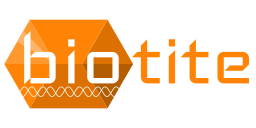biotite.sequence.CodonTable¶
- class biotite.sequence.CodonTable(codon_dict, starts)[source]¶
Bases:
objectA
CodonTablemaps a codon (sequence of 3 nucleotides) to an amino acid. It also defines start codons. ACodonTabletakes/outputs either the symbols or code of the codon/amino acid.Furthermore, this class is able to give a list of codons that corresponds to a given amino acid.
The
load()method allows loading of NCBI codon tables.Objects of this class are immutable.
- Parameters
- codon_dictdict of (str -> str)
A dictionary that maps codons to amino acids. The keys must be strings of length 3 and the values strings of length 1 (all upper case). The dictionary must provide entries for all 64 possible codons.
- startsiterable object of str
The start codons. Each entry must be a string of length 3 (all upper case).
Examples
Get the amino acid coded by a given codon (symbol and code):
>>> table = CodonTable.default_table() >>> print(table["ATG"]) M >>> print(table[(1,2,3)]) 14
Get the codons coding for a given amino acid (symbol and code):
>>> table = CodonTable.default_table() >>> print(table["M"]) ('ATG',) >>> print(table[14]) ((0, 2, 0), (0, 2, 2), (1, 2, 0), (1, 2, 1), (1, 2, 2), (1, 2, 3))
- codon_dict(code=False)¶
Get the codon to amino acid mappings dictionary.
- Parameters
- codebool
If true, the dictionary contains keys and values as code. Otherwise, the dictionary contains strings for codons and amino acid. (Default: False)
- Returns
- codon_dictdict
The dictionary mapping codons to amino acids.
- static default_table()¶
The default codon table. The table is equal to the NCBI “Standard” codon table, with the difference that only “ATG” is a start codon.
- Returns
- tableCodonTable
The default codon table.
- is_start_codon(codon_codes)¶
- static load(table_name)¶
Load a NCBI codon table.
- Parameters
- table_namestr or int
If a string is given, it is interpreted as official NCBI codon table name (e.g. “Vertebrate Mitochondrial”). An integer is interpreted as NCBI codon table ID.
- Returns
- tableCodonTable
The NCBI codon table.
- map_codon_codes(codon_codes)¶
Efficiently map multiple codons to the corresponding amino acids.
- Parameters
- codon_codesndarray, dtype=int, shape=(n,3)
The codons to be translated into amino acids. The codons are given as symbol codes. n is the amount of codons.
- Returns
- aa_codesndarray, dtype=int, shape=(n,)
The amino acids as symbol codes.
Examples
>>> dna = NucleotideSequence("ATGGTTTAA") >>> sequence_code = dna.code >>> print(sequence_code) [0 3 2 2 3 3 3 0 0] >>> # Reshape to get codons >>> codon_codes = sequence_code.reshape(-1, 3) >>> print(codon_codes) [[0 3 2] [2 3 3] [3 0 0]] >>> # Map to amino acids >>> aa_codes = CodonTable.default_table().map_codon_codes(codon_codes) >>> print(aa_codes) [10 17 23] >>> # Put into a protein sequence >>> protein = ProteinSequence() >>> protein.code = aa_codes >>> print(protein) MV*
- start_codons(code=False)¶
Get the start codons of the codon table.
- Parameters
- codebool
If true, the code will be returned instead of strings. (Default: False)
- Returns
- start_codonstuple
The start codons. Contains strings or tuples, depending on the code parameter.
- static table_names()¶
The possible codon table names for
load().- Returns
- nameslist of str
List of valid codon table names.
- with_codon_mappings(codon_dict)¶
Create an new
CodonTablewith partially changed codon mappings.- Parameters
- codon_dictdict of (str -> str)
The changed codon mappings.
- Returns
- new_tableCodonTable
The codon table with changed codon mappings.
- with_start_codons(starts)¶
Create an new
CodonTablewith the same codon mappings, but changed start codons.- Parameters
- startsiterable object of str
The new start codons.
- Returns
- new_tableCodonTable
The codon table with the new start codons.


